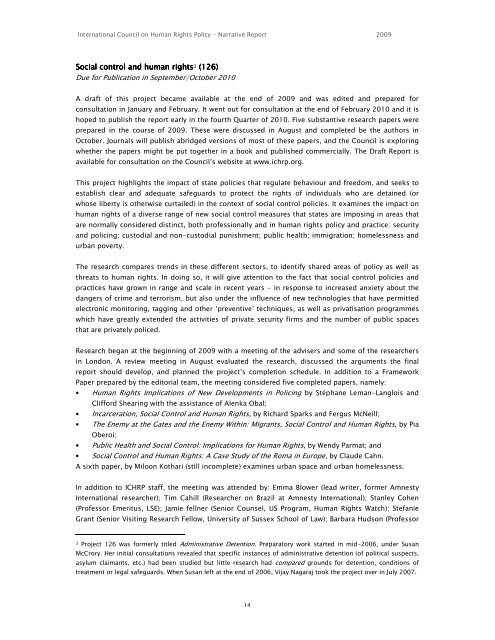NARRATIVE REPORT 2009 - The ICHRP
NARRATIVE REPORT 2009 - The ICHRP
NARRATIVE REPORT 2009 - The ICHRP
You also want an ePaper? Increase the reach of your titles
YUMPU automatically turns print PDFs into web optimized ePapers that Google loves.
International Council on Human Rights Policy - Narrative Report <strong>2009</strong><br />
Social control<br />
c<br />
and human<br />
rights<br />
3 (126)<br />
Due for Publication in September/October 2010<br />
A draft of this project became available at the end of <strong>2009</strong> and was edited and prepared for<br />
consultation in January and February. It went out for consultation at the end of February 2010 and it is<br />
hoped to publish the report early in the fourth Quarter of 2010. Five substantive research papers were<br />
prepared in the course of <strong>2009</strong>. <strong>The</strong>se were discussed in August and completed be the authors in<br />
October. Journals will publish abridged versions of most of these papers, and the Council is exploring<br />
whether the papers might be put together in a book and published commercially. <strong>The</strong> Draft Report is<br />
available for consultation on the Council’s website at www.ichrp.org.<br />
This project highlights the impact of state policies that regulate behaviour and freedom, and seeks to<br />
establish clear and adequate safeguards to protect the rights of individuals who are detained (or<br />
whose liberty is otherwise curtailed) in the context of social control policies. It examines the impact on<br />
human rights of a diverse range of new social control measures that states are imposing in areas that<br />
are normally considered distinct, both professionally and in human rights policy and practice: security<br />
and policing; custodial and non-custodial punishment; public health; immigration; homelessness and<br />
urban poverty.<br />
<strong>The</strong> research compares trends in these different sectors, to identify shared areas of policy as well as<br />
threats to human rights. In doing so, it will give attention to the fact that social control policies and<br />
practices have grown in range and scale in recent years - in response to increased anxiety about the<br />
dangers of crime and terrorism, but also under the influence of new technologies that have permitted<br />
electronic monitoring, tagging and other ‘preventive’ techniques, as well as privatisation programmes<br />
which have greatly extended the activities of private security firms and the number of public spaces<br />
that are privately policed.<br />
Research began at the beginning of <strong>2009</strong> with a meeting of the advisers and some of the researchers<br />
in London. A review meeting in August evaluated the research, discussed the arguments the final<br />
report should develop, and planned the project’s completion schedule. In addition to a Framework<br />
Paper prepared by the editorial team, the meeting considered five completed papers, namely:<br />
• Human Rights Implications of New Developments in Policing by Stéphane Leman-Langlois and<br />
Clifford Shearing with the assistance of Alenka Obal;<br />
• Incarceration, Social Control and Human Rights, by Richard Sparks and Fergus McNeill;<br />
• <strong>The</strong> Enemy at the Gates and the Enemy Within: Migrants, Social Control and Human Rights, by Pia<br />
Oberoi;<br />
• Public Health and Social Control: Implications for Human Rights, by Wendy Parmat; and<br />
• Social Control and Human Rights: A Case Study of the Roma in Europe, by Claude Cahn.<br />
A sixth paper, by Miloon Kothari (still incomplete) examines urban space and urban homelessness.<br />
In addition to <strong>ICHRP</strong> staff, the meeting was attended by: Emma Blower (lead writer, former Amnesty<br />
International researcher); Tim Cahill (Researcher on Brazil at Amnesty International); Stanley Cohen<br />
(Professor Emeritus, LSE); Jamie fellner (Senior Counsel, US Program, Human Rights Watch); Stefanie<br />
Grant (Senior Visiting Research Fellow, University of Sussex School of Law); Barbara Hudson (Professor<br />
3<br />
Project 126 was formerly titled Administrative Detention. Preparatory work started in mid-2006, under Susan<br />
McCrory. Her initial consultations revealed that specific instances of administrative detention (of political suspects,<br />
asylum claimants, etc.) had been studied but little research had compared grounds for detention, conditions of<br />
treatment or legal safeguards. When Susan left at the end of 2006, Vijay Nagaraj took the project over in July 2007.<br />
14
















